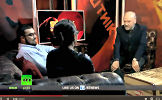 "In Paris this week [week of September 20], the great and the gruesome came together to discuss the existential threat of ISIS, but the two countries actually doing something meaningful about that threat - Syria and Iran - were of course not invited. Confused? You won't be after you have heard our first guest, Hasib Risby, a commentator on the region and part of digital resistance." A very clear analysis of what is happening with ISIS, Syria, Iran, and the US in the Middle East, by George Galloway and Gayatri Pertiwi with Haseeb Rizvi. The original program (with no transcript) is at http://rt.com/shows/sputnik/189028-isis-summit-paris-uk/
"In Paris this week [week of September 20], the great and the gruesome came together to discuss the existential threat of ISIS, but the two countries actually doing something meaningful about that threat - Syria and Iran - were of course not invited. Confused? You won't be after you have heard our first guest, Hasib Risby, a commentator on the region and part of digital resistance." A very clear analysis of what is happening with ISIS, Syria, Iran, and the US in the Middle East, by George Galloway and Gayatri Pertiwi with Haseeb Rizvi. The original program (with no transcript) is at http://rt.com/shows/sputnik/189028-isis-summit-paris-uk/
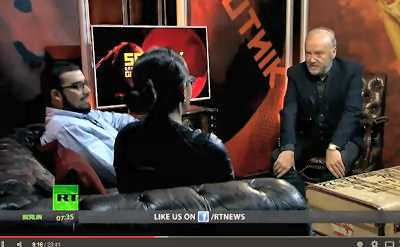
GALLOWAY: A state of total confusion reigns in the western capitals about what to do about the catastrophe unfolding in Syria and in Iraq. The UK foreign secretary, Philip Hammond, rules out Britain going back to war in Iraq and is instantly repudiated by David Cameron. Still, at time of recording (September 20, 2014), who insists that 'all options remain open'.
GAYATRI: In the US, things are no more clear. There, the commander in chief of the US military, President Obama, is impudently contradicted by the top military brass. The president says that there will be absolutely no American boots on the ground. And yet, the generals, including the Chairman of the joint chiefs of staff, tells the Senate Armed Services Committee that there will be, in fact, boots on the ground, if necessary.
GALLOWAY: Cameron claims he can bomb ISIS in Syria from over Syrian airspace, without the permission of the Syrian government. The said Syrian government is armed and dangerous and entirely within its legal rights to shoot down any and all military aircraft over their territory, and has the military hardware to do so.
GAYATRI: Neither the US nor the UK governments who, some argue, caused the disaster in the first place, have any intention of helping the actual government of Iraq - a government only in power because of them. And they won't even deliver to Bagdad the weapons and planes they have already paid for, even though ISIS is at the gates.
GALLOWAY: In Paris this week [week of September 20], the great and the gruesome came together to discuss the existential threat of ISIS, but the two countries actually doing something meaningful about that threat - Syria and Iran - were of course not invited. Confused? You won't be after you have heard our first guest, Hasib Risby, a commentator on the region and part of digital resistance.
Haseeb, welcome to the show. Tell the viewers, first of all, how things are on the ground now, in Iraq. What territory does ISIS hold? Who's fighting them? Are there any indications of a change in the military situation on the ground?
HASEEB: So the situation varies from parts to parts, but primarily, we're talking about north east Syria and north west Iraq being under heavy ISIS influence. Not necessarily blanket control, but heavy segments of those areas. And, within those areas that they have control [over] there's various battles taking place along the borders of those regions that they control. So, for example, they're fighting with Kurds, they're fighting against other Syrian rebel groups, such as Al-Nusra and the Islamic Front, as well as, I think, the Free Syrian army as well. And, towards Iraq, they're fighting, obviously, the Iraqi armed forces as well as Shia militias that are defending their territory against further ISIS expansion. So, at the moment, ISIS are involved in a lot of battles. They're fighting quite a few people at the same time, to be honest. And the recent kind of resurgence of the Iraqi armed forces as well as from the US airstrikes and stuff has prevented futher expansion, but they are showing no sign of stopping. And that's kind of worrying. They seem to be still going about their day to day exectuions in a very kind of sophisticated, well-planned manner.
GALLOWAY: And they're still controlling major Iraqi cities.
HASEEB: Absolutely. And, you know, in Syria, for example, in the city of Ah-Raqqah [1], they more or less run the show there completely.
GALLOWAY: Which is thought to be the place where they're carrying out these hidious executions of foreigners.
HASEEB: Yeah, yeah. That part and various border towns between Iraq and Syria, where there is, you know, very loose control of anything, is where they'are operating, and they have pretty good control over those areas.
GALLOWAY: Now you mentoned the US airstrikes. I've seen US air strikes. I've seen them in Vietnam, I've seen them in Cambodia, I've seen them in the Iraq war, I've seen them in Afghanistan. These are not meaningful US airstrikes. Which leads me to wonder why? If the United States was really as concerned about ISIS as they say they are and that we should be, they would be bombing them a lot more seriously than they are. These are very desultory, very occasional, and very small airstrikes. Why?
HASEEB: Absolutely. And, you know, adding on to what you're saying, they should have reacted much sooner, one would imagine. It's taken this long for them to react to it, whilst previous prime minister Nuri Al-Maliki,[3] was constantly pleading to America for support against the growing threat of militancy in his country, but it fell on deaf ears, basically. What you see is as soon as for example, ISIS started threatening the Kurdish region, is when America suddenly started taking things more seriously -
GALLOWAY: Only there, in the Kurdish region, where their oil interests are -
HASEEB: Where their oil interests are -
GALLOWAY: And where they want to break Iraq up!
HASEEB: Well, there you go. It's a strategic place for them, Kurdistan, because, you know, they've got ties with Israel, and you've heard storied about Kurdistan selling oil to Israel, just a matter of weeks after ISIS took over and stuff like that, completely illegally. But you see that America and the west in general, only reacted then. Not when 2000 or so Shia army cadets were massacred
GALLOWAY: Why can't the regional players sort this matter out themselves?
HASEEB: What you have at the moment is these very confused blurred lines that exist where, whilst Saudi Arabia and all these countries, essentially, went to Paris for a deal, were the ones that essentially that kind of allowed ISIS to exist in the first place, through turning a blind eye to money and weapons being trafficked to them. And now they realise that it's going to come back to bite them. So now they're trying to react, but it's a bit too late, because the people inside these countries, already, inside Saudi Arabia, inside Qatar, they've been fed the sectarian rhetoric already. So they buy the ISIS line very easily, You see already, in places like Jourdan and Saudi Arabia, many ISIS flags have been raised, and there are a lot of people
GAYATRI: So the opposite of feeling threatened?
HASEEB: Exactly, so, to be honest with you, Saudi Arabia, any of these Gulf states, to try and intervene militarily against ISIS will just be counter-productive as well, just as much as it would be for the US to do so. Which then makes it another sticky situation. If Iran and Syria were the only ones to kind of attack ISIS, then it becomes, 'Oh, the Shias are attacking Sunnis!'
GALLOWAY: Hasib, there's a state of confusion. There's no Islamic State, but there's a state of confusion reigning over all this. I mean, even in ontological terms. What exactly are ISIS? Who are they? What do they want?
HASEEB: ISIS... if you try and simplify what they are, essentially is a collection of ruthless, angry and violent individuals that have come together under a false notion of, you know, a 'califphate',[4] under some sort of illusion that they're trying to do a good thing for the world. And their ethos essentially is something that has been fed by something that has been prevalent in Saudi Arabia for so long, under the teachings of Wahhabism and Salafism. And I understand, obviously that not all Wahhabis and not all Salafis are as extreme as ISIS,
GALLOWAY: - Of course not -
HASEEB: However, the fundamentals behind these sects have really spurred on the kind of ideological principles for why ISIS go about doing the things that they do. And further more, it's like, it seem that they've kind of tried to go one above Al Qaeda, with their ruthlessness. They've decided, you know, 'We're going to stand out!' - you know - 'This is going to be our brand!' - almost. And the way they celebrate and glorify their violence, and dehumanise those that they're killing, it's actually pretty chilling. And I don't we've seen a group like it.
GALLOWAY: Or the end of it.
GAYATRI: I mean, from the Free Syrian Army we've already witnessed the most horrible things -
HASEEB: And they're the moderate ones, by the way!
GAYATRI: - And now -
GALLOWAY: They were the moderates - the moderate heart-eaters, you mean! We haven't actually seen ISIS eating hearts yet. That's probably something still to come. They behave like a kidn of death cult.
HASEEB: Yeah.
GALLOWAY: There seems nothing Islamic about them.
HASEEB. No.
GALLOWAY: I hate it when people call them the Islamic State because they're neither Islamic nor are they a state. How do they find any theological justification for the mass excecution of helpless, handcuffed prisoners in the wartime? How do they justify theologically slicing off the heads of Aid workers and journalists that fall into their hands, and videoing it for the entertainment, presumably, of their own site?
HASEEB: Their justification, presumably, is that anyone that disagrees with their very specific set of thoughts is not worthy of life, essentially. Especially when you're on their land.
GALLOWAY: But it's not their land, is it?
HASEEB: Well -
GALLOWAY: The person slicing the heads off of these American and British journalists is thought to be English.
HASEEB: Yeah.
GAYATRI: Well, they're from London. That's the part I don't compute. Young men from London! You know, growing up in this modern global city and then going back -
HASEEB: For them, their land is essentially this Islamic caliphate land. You've seen the view of - I'm sure you've seen the picture of where they want to go eventually. So they've carved this section out for themselves and whatever they say goes in this area. I've seen videos of scholars - sorry - their clerics, rather, where they tell you that when you're cutting someone's head off, you should enjoy it. It shouldn't be like when you kill an animal - you should do that very mercifully - but when you kill a human being, because it's a enemy of God, you should enjoy it. Take your time. So it's very, very disturbing. There's this very kind of strong lust towards violence within this group that is - I don't think we've seen it before. I don't think we've seen, you know, a group like this before.
GALLOWAY: No.
Gayatri: They're hell on earth, isn't it.
HASEEB: Yeah. I mean, to be fair, it was in one of the newspapers, the Guardian, I think, that introduced ISIS in the British media as, 'Here's a group that is worse than Al Quaida.' And that stood out to me as well. I'm thinking, as a good way to put it -
GALLOWAY: They make Al Quaida look like boy scouts. Now, how do we follow Digital Resistance and what do you do?
HASEEB: So, what we do; we collate news from various media outlets to try and put together a story line that actually makes sense that's actually true as to what's happening. As well as that we provide analysis and opinions on various newstories. You can follow us on twitter @dgtlresistance or facebook.
NOTES
Civil war
Main article: Battle of Ar-Raqqah
In March 2013, during the Syrian civil war, Islamist jihadist militants from Al-Nusra Front and other groups overran the government loyalists in the city and declared it under their control after seizing the central square and pulling down the statue of the former president of Syria Hafez al-Assad.
The Al Qaeda-affiliated Al-Nusra Front set up a sharia court at the sports centre[ and in early June 2013 the Islamic State of Iraq and Syria (ISIS) said they were open to receive complaints at their Raqqa headquarters.
Since May 2013 the ISIS has been increasing its control over the city, at the expense of the Free Syrian Army and the Al-Nusra Front. The ISIS has executed Alawites and suspected supporters of Bashar al-Assad in the city and attacked the city's Shia mosques and Christian churches such as the Armenian Catholic Church of the Martyrs, which has since been converted into an ISIS headquarters. The Christian population of Ar-Raqqah, which was estimated to be as many as 10% of the total population before the civil war began, has largely fled the city.
In January 2014 it was reported that ISIS militants in the city gained control of the western part of a Syrian army base, while the group closed all educational institutions in the city, where it has withstood rebel assaults.
On 25 July, the Islamic State captured the Syrian Army base in Raqqah which garrisoned the 17th Division, and beheaded many soldiers.
[3] Nouri Kamil Mohammed Hasan al-Maliki, previous primeminister of Syria, current Vice President.
[4] A Caliphate is an islamic state, led by a political and religious leader, known as a caliph, seen as a successor to the Islamic prophet, Muhammad.
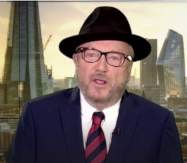 As the newly-elected UK MP George Galloway recently stated, on Episode 334 of his Mother of All Talk Shows (MOATS), "Will they, won't they, will they won't they, will they they join the dance - Biden says 'no', Netanyahu says 'yes'. Who is going to prevail? How can Netanyahu not say 'yes' because his cabinet have, by a majority, already decided that, within 24 to 48 hours, what will effectively become World War 3 will begin. So, hold your children close and listen carefully to tonight's show, the Mother of all Talk Shows. Who knows? It may be the last time that we ever talk. It's going to be the Mother of all Talk Shows. Stay tuned."
As the newly-elected UK MP George Galloway recently stated, on Episode 334 of his Mother of All Talk Shows (MOATS), "Will they, won't they, will they won't they, will they they join the dance - Biden says 'no', Netanyahu says 'yes'. Who is going to prevail? How can Netanyahu not say 'yes' because his cabinet have, by a majority, already decided that, within 24 to 48 hours, what will effectively become World War 3 will begin. So, hold your children close and listen carefully to tonight's show, the Mother of all Talk Shows. Who knows? It may be the last time that we ever talk. It's going to be the Mother of all Talk Shows. Stay tuned."
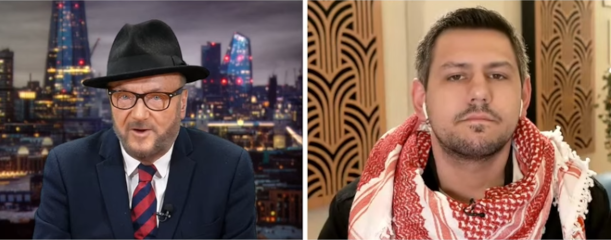 In the recent 29 February by-election for the UK seat of Rochdale, George Galloway campaigned against Israel's mass-murder of Palestinians in Gaza and for Julian Assange's freedom. He defeated the two major pro-war parties, Labor and the Conservatives, to become the new MP for Rochdale in the House of Commons. In the attached 18 minute YouTube video, he is interviewed by Syrian-born British journalist Richard Medhurst.
In the recent 29 February by-election for the UK seat of Rochdale, George Galloway campaigned against Israel's mass-murder of Palestinians in Gaza and for Julian Assange's freedom. He defeated the two major pro-war parties, Labor and the Conservatives, to become the new MP for Rochdale in the House of Commons. In the attached 18 minute YouTube video, he is interviewed by Syrian-born British journalist Richard Medhurst.
 This discussion on Crosstalk asks whether in the prosecution or persecution of Julian Assange, the western world is seeing the death of journalism. Michael Patchett-Joyce, a barrister specialising in international and European law, brings some new views to the program. John Wight counters with some persuasive political analysis, as does ex-British parliamentarian, George Galloway. The issue of the courts and the 'public good' comes up. John Wight points out that this is an issue of class; the public good is really about the good of the establishment. Galloway says that, if Julian is extradited to the United States, there will be no juries and the US will not feel itself bound to any promises it may have made to Britain in this matter. Patchett-Joyce suggests that the case has a long way to go before a decision can be made about extradition. At no time does anyone mention Julian's cat, but we think this might be a picture of it.
This discussion on Crosstalk asks whether in the prosecution or persecution of Julian Assange, the western world is seeing the death of journalism. Michael Patchett-Joyce, a barrister specialising in international and European law, brings some new views to the program. John Wight counters with some persuasive political analysis, as does ex-British parliamentarian, George Galloway. The issue of the courts and the 'public good' comes up. John Wight points out that this is an issue of class; the public good is really about the good of the establishment. Galloway says that, if Julian is extradited to the United States, there will be no juries and the US will not feel itself bound to any promises it may have made to Britain in this matter. Patchett-Joyce suggests that the case has a long way to go before a decision can be made about extradition. At no time does anyone mention Julian's cat, but we think this might be a picture of it.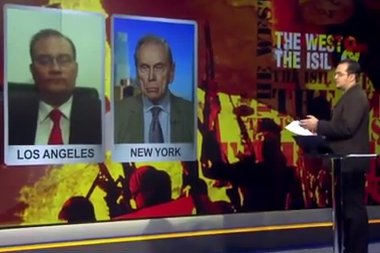
 "In Paris this week [week of September 20], the great and the gruesome came together to discuss the existential threat of ISIS, but the two countries actually doing something meaningful about that threat - Syria and Iran - were of course not invited. Confused? You won't be after you have heard our first guest, Hasib Risby, a commentator on the region and part of digital resistance." A very clear analysis of what is happening with ISIS, Syria, Iran, and the US in the Middle East, by George Galloway and Gayatri Pertiwi with Haseeb Rizvi. The original program (with no transcript) is at
"In Paris this week [week of September 20], the great and the gruesome came together to discuss the existential threat of ISIS, but the two countries actually doing something meaningful about that threat - Syria and Iran - were of course not invited. Confused? You won't be after you have heard our first guest, Hasib Risby, a commentator on the region and part of digital resistance." A very clear analysis of what is happening with ISIS, Syria, Iran, and the US in the Middle East, by George Galloway and Gayatri Pertiwi with Haseeb Rizvi. The original program (with no transcript) is at 
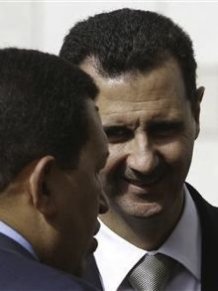
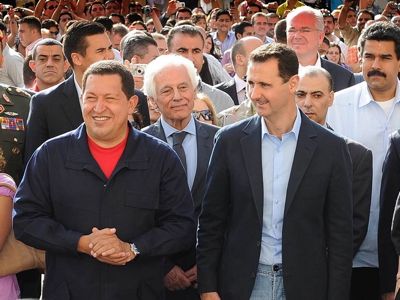

Recent comments